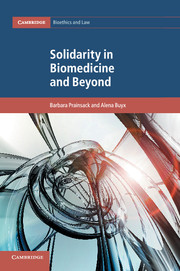Book contents
- Frontmatter
- Contents
- Foreword
- 1 Solidarity: A Brief History of A Concept and A Project
- PART I Theorising Solidarity
- PART II Solidarity in Practice
- 5 Solidarity in Practice I: Governing Health Databases
- 6 Solidarity in Practice II: Personalised Medicine and Healthcare
- 7 Solidarity and Organ Donation
- PART III Conclusions
- Afterword
- Bibliography
- Index
- Books in the Series
5 - Solidarity in Practice I: Governing Health Databases
from PART II - Solidarity in Practice
Published online by Cambridge University Press: 09 February 2017
- Frontmatter
- Contents
- Foreword
- 1 Solidarity: A Brief History of A Concept and A Project
- PART I Theorising Solidarity
- PART II Solidarity in Practice
- 5 Solidarity in Practice I: Governing Health Databases
- 6 Solidarity in Practice II: Personalised Medicine and Healthcare
- 7 Solidarity and Organ Donation
- PART III Conclusions
- Afterword
- Bibliography
- Index
- Books in the Series
Summary
Introduction
New opportunities and technologies for large-scale data linkage and datamining have rendered databases one of the key resources for many areas of public life. In fields as varied as medical research, marketing and government, databases have become indispensible resources for generating knowledge and innovation. They are sources of great social benefit, and also of concern. Ethical and regulatory challenges arise from the virtual ubiquity of databases and the increasing digitalisation of datasets, and also from increasing possibilities to link and search digital datasets (e.g. Mittelstadt and Floridi 2015; NCoB 2015; Pasquale 2015; Prainsack 2015a). Moreover, many of the datasets established and used today lend themselves to both aggregation and ‘drilling down’, namely the automated searching for information throughout different hierarchies of records or files. This means that it has become much easier to go back and forth between the individual and aggregate level. As sociologist Lawrence Busch (2014) points out,
In times past, the few [large-scale datasets] that existed were such that users were either forced to work with aggregates (e.g., census data), or they consisted of massive tomes (e.g., telephone directories) or huge files (e.g., real property or medical case records) from which individual records could be retrieved. However, with few exceptions, those [datasets] designed for aggregate analysis were such that drilling down was impossible, while those designed for drilling down were such that aggregation was all but impossible. All were both expensive and time consuming to collect, and even more expensive to analyze (our emphasis).
Because different datasets can be linked together much more easily, it is becoming increasingly common for insights obtained at the aggregate level to be used to make probabilistic ‘predictions’ about individuals. An example for this is the practice of consumer scoring (Dixon and Gellman 2014). Here, perfectly innocuous looking pieces of information about a person – such as the frequency of her grocery purchases, for example, the length of time she has been with her current employer or the type of car she drives – are used to assign a score to a person based on the statistical correlation of these pieces of information with relevant behaviours or characteristics, such as defaulting on a mortgage, suffering from a chronic illness or causing a car accident.
- Type
- Chapter
- Information
- Solidarity in Biomedicine and Beyond , pp. 97 - 122Publisher: Cambridge University PressPrint publication year: 2017

